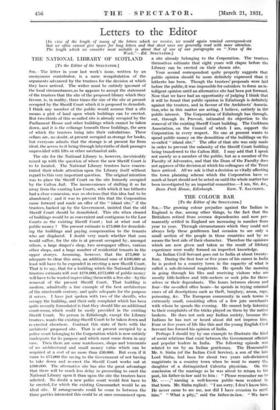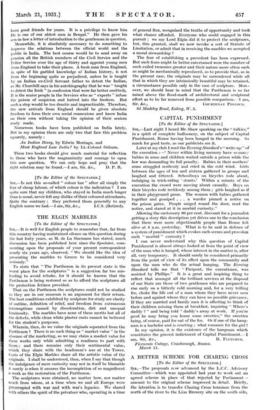THE COLOUR BAR
[To the Editor of the SPECTATOR.]
Six,—The growing colour prejudice against the Indian in England is due, among other things, to the fact that the Britishers retired from ()verses dependencies and now per- manently settled in England are increasing in number from year to year. Through circumstances which they could not always help these gentlemen had occasion to see only a small section of the people in those countries and by no means the best side of their character. Therefore the opinions which are now given and taken as the result of lifelong experience were really formed on imperfect knowledge.
An Indian Civil Servant goes out to India at about twenty- four. During the first four or five years of his career in India he is posted to a country town in the capacity of what is called a sub-divisional magistrate. He spends the morning in going through his files and receiving visitors who are mostly title-holders and title-seekers or seek jobs for them- selves or their dependants. The hours between eleven and four—the so-called office hours—he spends in trying criminal cases of all descriptions such as theft, burglary, arson, rape, poisoning, &c. The European community in such towns is extremely small, consisting often of a few jute merchants with whom he spends the evening. He cannot help listening to their complaints of the tricks played on them by the native brokers. He does not seek any Indian society, because the Indians he has met or heard about did not impress him. Four or five years of life like this and the young English Civil Servant has formed his opinion of India.
Perhaps I should try by one example to illustrate the kind of social relations that exist between the Government officials and popular leaders in India. The following episode was related to me by an Indian gentleman. The Honourable Mr. S. Sinha (of the Indian Civil Service), a son of the late Lord Sinha, had been for about two years sub-divisional magistrate in a country town when he went to marry the daughter of a distinguished Calcutta physician. On the conclusion of the marriage as he was about to return to his post, his father-in-law said to him : " Please remember me to Mr. —," naming a well-known public–man resident in that town. Mr. Sinha replied : " I am sorry, I don't know him. He never came to see me, nor did I have occasion to meet hint." " What a pity," said the father-in-law. " We have
been good friends for years. It is a privilege to know him He is one of our ablest men in Bengal." He then gave his son-in-law a letter of introduction to the gentleman in question.
Meanwhile, it is absolutely necessary to do something to improve the relations between the official world and the public in India. The best course would be to send away on pension all the British members of the Civil Service and the Police Service over the age of thirty and appoint young men from England to take their places. A fresh man from England, in spite of his garbled knowledge of Indian history, is not from the beginning quite so prejudiced, unless he is taught by an Indian ex-Civil Servant • father to detest the Indian, as Mr. Churchill says in his autobiography that he was " taught to detest the Irish " (a confession that were far better omitted). It is the senior people in the Services who as " experts " infuse the poison of suspicion and hatred into the freshers. But such a step would be too drastic and impracticable. Therefore, the new arrivals from England should be given absolute freedom to form their own social connexions and know India on their own without taking the opinion of their seniors ready made.
Numerous books have been published on India lately. But in my opinion there are only two that face this problem squarely, namely :
An Indian Diary, by Edwin Montagu, and Must England Lose India? by Lt.-Colonel Osburn.
These two books should give much material for reflection to those who have the magnanimity and courage to open this sore question. We can only hope and pray that the
right solution may be found.—I am, Sir, &c., D. P. R.



















































 Previous page
Previous page